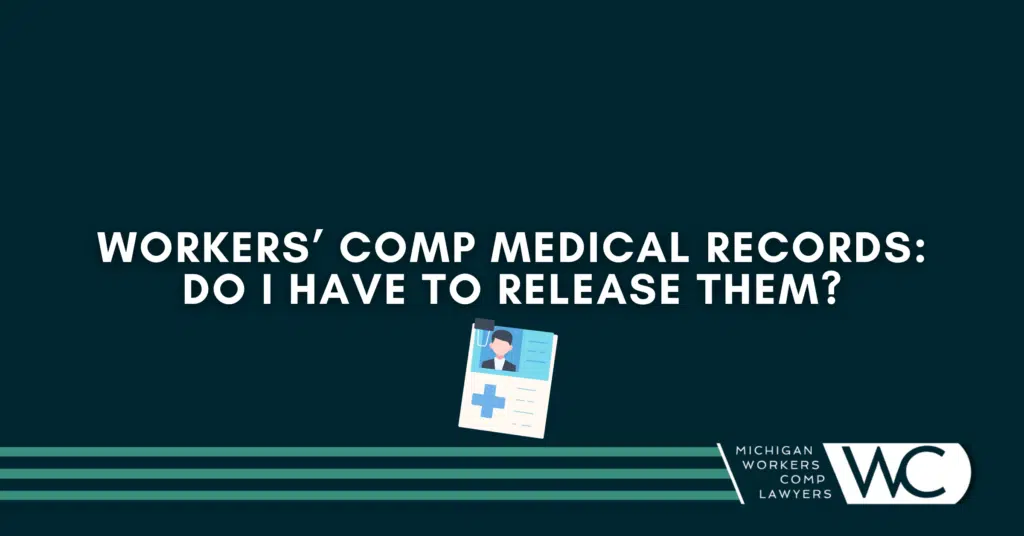
Michigan lawyer discusses reasons why claimants are required to sign workers’ compensation medical records release.
Our job as workers’ comp lawyers is to protect individuals who are hurt. We do this through knowledge and experience. Understanding legal rights is the key to making sure the employer or its insurance company does not take advantage. Our attorneys recieve a lot of questions regarding Michigan workers’ comp and the release of medical records. Many people get nervous when the insurance company starts digging into their medical background. It feels like a violation of their privacy rights.
Can workers’ comp ask for medical records in Michigan?
In Michigan, workers’ comp insurance companies can ask for and review your medical records to determine if treatment is reasonable and necessary. It provides a snapshot of how an employee got hurt and what medical treatment is needed. Bills should be paid 100% without any co-pays or deductibles being owed.
What if workers’ comp wants all my medical records in Michigan?
In Michigan, sometimes a workers’ comp insurance company wants to look at all your medical records (even from years prior from the work accident) to determine if a person has any preexisting conditions. These records can be used to dispute claims if they show a claimant has not been truthful.
Physician-patient privilege is generally waived if an employee is relying upon medical records/testimony to support his or her Michigan workers’ comp claim. Additionally, privacy rules under the Health Insurance Portability and Accountability Act (HIPAA) generally do not apply to workers’ comp insurance claims.
Medical history is an “open book” for the insurance company, but this does give them a blank check to speak with a treating doctor. It is important to have a lawyer to ensure that workers’ comp rules are being followed. This is especially true when a nurse case manager has been assigned to the claim. Watch out for attempts to change work restrictions or medical treatment plans.
Remember, Michigan workers’ compensation law protects employees who get hurt on-the-job. All reasonable and necessary medical treatment must be paid by either the employer or its insurance company. This includes emergency room visits, doctor appointments, hospital stays, prescriptions, physical therapy, durable medical equipment, surgery, and even home medications.
Independent Medical Examination (IME)
Michigan law permits an insurance company to have a claimant examined by a doctor of its own choosing at the IME. Medical history will be obtained and shared for this purpose. These doctors are not independent and make careers out of testifying against disabled employees. Expect to be asked about prior injuries and preexisting conditions. Insurance companies refer to these examinations as second opinions, but they are not.
It is common to see IME reports that say no additional medical treatment is needed or disability was not caused by job in the first place. This happens months or years after the initial workers’ comp claim. Biased medical opinions should always be challenged in workers’ comp court. Deposition testimony from a treating doctor can be used to show a claimant needs additional medical treatment and/or is still disabled.
Injured on the job in Michigan? Our workers’ comp attorneys can help!
If you were injured on the job in Michigan and you have questions about the release of medical records and your workers’ comp claim, then call now to speak with an experienced attorney, or fill out our contact form for a free consultation. There is absolutely no cost or obligation. We’re here for you.
Our attorneys have been exclusively helping injured workers in Michigan for more than 35 years. Our attorneys can help you better understand Michigan laws and what happens after someone has been hurt on the job. To see what our own clients have to say about the caring, compassion, and communication they received from us, you can read in their own words about their experience here on our testimonials page from clients we have helped.
Michigan Workers Comp Lawyers never charges a fee to evaluate a potential case. Our law firm has represented injured and disabled workers exclusively for more than 35 years. Call (844) 316-8033 for a free consultation today.
Related information:



